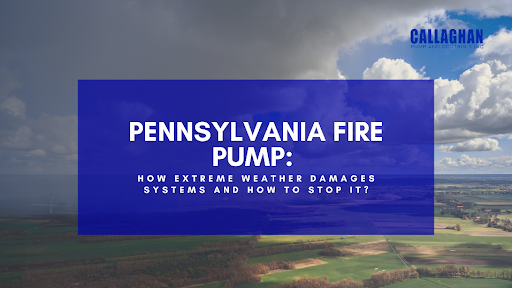
May 15th, 2025
Pennsylvania experiences extreme weather, including blizzards, freezing rain, heatwaves, and heavy storms. These changing conditions strain vital building systems, particularly Pennsylvania Fire Pump, that are required to function flawlessly in an emergency.
When subjected to cold temperatures, moisture buildup, and power outages, these systems might fail or lose performance when needed the most. Let’s break down the damage that harsh weather can cause and what building owners, contractors, and facility managers can do to limit that damage.
Fire pumps are crucial in keeping a building safe, but severe weather can harm them. In states like Pennsylvania, brutal winters and storms challenge the stability of these systems. The following are the primary weather-related threats to PA fire pumps:
During Pennsylvania winters, water inside pumps, valves, and pipes can freeze completely. This often leads to cracks, blockages, and system shutdowns. Also, diesel engines may have trouble starting if fuel or oil is too thick in the cold.
Moisture can accumulate and freeze inside the pump room as warm indoor air encounters cold surfaces. In the long term, this can result in rust on metal components or short circuits in electrical boards. These problems can quickly snowball without sufficient airflow.
Snow and ice storms frequently disrupt power in Pennsylvania, sometimes for extended periods. Fire safety systems that rely only on electric fire pumps are vulnerable during these outages. Fire protection can stop at the worst possible time if the power fails.
Salt and other de-icers used near building foundations can speed up corrosion. When these substances come into contact with exposed pump parts, seals and joints may begin to break down. Continued exposure weakens the overall system and shortens equipment lifespan.
High temperatures can overheat Pennsylvania Fire Pump components, especially when the system experiences insufficient ventilation. Excessive overheating can cause premature wear, decreased efficiency, and even failure during critical operations. Heat waves can also stress power grids, raising the risk of outages that turn off electrically powered fire pumps.
Flooding from extreme rains and storms can threaten PA fire pump systems, especially if the equipment is at or near ground level (e.g., a basement). Flooding can interfere with electrical components, corrode metal parts, or make the pump inoperative.
While Pennsylvania Fire Pumps face serious challenges during extreme weather, there are ways to reduce the risks. With proper care, periodic checks, and appropriate upgrades, systems can continue functioning through snow, floods, and power outages. Even small actions can lead to significant gains in long-term reliability and safety.
Maintain a temperature above 40°F inside the pump room to stop freezing conditions. Pump room cold prevention requires heat trace cables, pipe insulation, or small heaters, according to specific requirements. Establish that heating systems function correctly during the first days of winter weather.
Establish a regular procedure for weekly checks, including searching for leakages while measuring pressure levels and monitoring battery and fuel supplies. Also, do a monthly no-flow operation to prevent pumps from starting incorrectly. Testing the functioning of smoke control systems during actual fires requires conducting annual flow tests to determine system readiness.
Standard components fail under extreme conditions, so it is better to use environment-specific parts. The selection process requires the installation of cold-rated seals and piping, together with heat-resistant components for various seasons. All damaged components should be replaced before seasonal modifications to prevent unexpected equipment failure.
You should have backup power available because interruptions often occur during stormy and heatwave periods. Generators and diesel pumps will operate the system if electricity becomes unavailable. Regular testing of the backup system should take place to prevent potential surprises.
Pennsylvania fire pump systems should have sump pumps installed while adding check valves and waterproof enclosures to prevent damage from flooding. Build all equipment at elevated positions while maintaining open drainage systems that channel water into safe zones.
Check all exposed components for rust or wear during and after winter. Be particularly observant in spots where snowmelt or salt runoff may accumulate. You can prevent long-term damage by applying protective coatings or replacing corroded parts as necessary.
In short, cold weather is harsh on Pennsylvania Fire Pumps, but preparation can make a big difference. Stay ready with regular checks, heat solutions, and strong backup plans. For high-quality distribution of Pennsylvania Fire Pump systems, reach out to Callaghan Pump today!
john@callaghanpump.com,
eileen@callaghanpump.com,
dan@callaghanpump.com,
sales@callaghanpump.com,
service@callaghanpump.com












